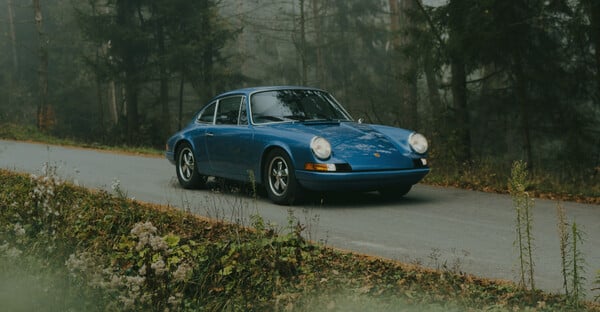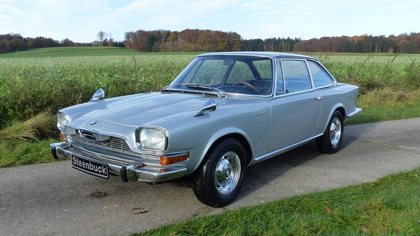Description
This incredibly rare piece of BMW history has been in the seller’s care for the past 35 years. Professionally restored in 2009 by Classic Restorations Ltd of Alyth in Perthshire, it is finished in metallic blue and has had the original V8 engine replaced by a BMW M30 2. 8-litre six-cylinder engine from the E12 5 Series range of cars.
A five-speed manual gearbox plus an electronic ignition system and an electric fuel pump were added at the same time, and further modifications include Monroe ‘Load Leveller’ pneumatically adjustable rear shock absorbers, refurbished rear leaf springs, new front dampers, and an uprated servo-assisted braking system.
These changes work in conjunction with the standard all-round disc brakes and power steering to create a car being ‘great fun” and “a great family car over the years”.
Reliable enough to have been driven down to Le Mans as well as across Scotland over the past three decades, he discovered it in 1989 while visiting his future parents-in-law in Belgium.
It was owned by an American gentleman who’d moved to California, and they persuaded him to sell it to their future son-in-law, who then had an adventure driving it back from its European home all way to his in Scotland, which was a fitting way to start his multi-decade relationship with his “beloved” car!
The dark metallic blue coachwork looks terrific, doesn’t it – and it is immediately obvious why they were christened ‘Glaserati’ back in the day.
And this one is still in good shape, too. With a healthy lustre to the finish and good panel alignment and shutlines, it speaks well of its restoration and subsequent curation. Mind you, the work did include a bare metal respray after a set of new wings and sills (sourced from the Glas Club International) had been fitted.
The lamp lenses are good too, as is the window glass and badging. The auxiliary spot lamps are another nice touch.
The steel wheels are in a good condition. The BMW chrome wheel trims are in a very good condition, and the wheels are fitted with 195/ 70R14 Goodyear Eagle Ventura tyres, all of which have plenty of tread left on them.
The cabin is an absolute period joy being crammed full of lovely features like the wood-rimmed, three-spoke steering wheel, comprehensive instrumentation by way of a seven-dial dashboard, and black vinyl seating for four or five people.
And it’s all in great shape with no obvious damage and a well-cared-for feel that’s underpinned by the history file.
The front seats are free of rips, tears, and other damage and are still plump and comfortable. The rears, as you’d expect, are in an even better condition, and their sculpted shape and large central armrest might limit the comfort for three people sitting abreast, but they increase it for two.
That said, five inertia reel seatbelts have been fitted.
The top of the dashboard is free of cracks and other damage, the matching black vinyl door cards are in great shape, and the headlining and carpets are clean.
The instruments cover speed and engine revolutions plus distance travelled, fuel level, coolant temperature, oil temperature and pressure, and time via a full suite of gauges – and the five VDO dials have an intricate ‘V8’ symbol on them to remind the driver of how special their car is.
As for changes from the original specification, two of the instruments in the dashboard are recent replacements, the rear quarter panels have been fitted with speakers, and a Sony CD-multichanger sits in the boot.
Edinburgh Sports Cars went through the BMW only recently, running up a £1, 700 bill by way of a refurbished radiator, front dampers, waterpump, and battery in addition to some fettling of the headlamp wiring and handbrake mechanism.
This builds on the same firm having sorted out a few bits and bobs earlier this year, and that four-figure bill joins many others from them: all-in-all, there are just over £7, 500 in paperwork, and this sum doesn’t include the invoices in the history file from other companies for servicing and maintenance over the years.
As already mentioned, the original V8 engine failed during his ownership and the seller took the decision to fit an E28 engine from the 5 Series. This has, he says, transformed the car and being a keen member of the Glas Club International - something he recommends the winning bidder join - he donated the engine to them to be used for spares.
Its replacement engine starts well, idles and revs as it should, and does it all with good oil pressure and no untoward noises.
The underside has some normal surface rust in the usual places and would benefit from having this wire-brushed off and treated to kill any that remains.
A number of spares are included in the sale including a chrome grill, wheel trims and wing mirrors. The BMW’s MoT certificate is valid until January 2025, the recent Vehicle History Check is clear, and the history file contains plenty of paperwork to prove the quality of its curation over the years.
This actual car is due to feature in the forthcoming film Lockerbie featuring Colin Firth, which is scheduled to be broadcast on Sky TV.
Recently fettled and subtly upgraded to better meet the challenges posed by 21st century roads, this ultra-rare BMW Glas Coupé is fighting fit and ready to face whatever trials the next thirty years may bring.
It’s a very stylish example of a car most have never heard of and draws a huge amount of attention wherever it goes with its elegant design by Pietro Frua.
The car is currently registered in the UK, with valid DVLA V5 document and valid MOT, on the name of sellers UK-based company.
Viewing is strongly encouraged, this gem is located in Turin, Italy. Viewings are strictly by appointment.
HISTORY
Nicknamed the ‘Glaserati’ because its Frua design shares many of the same themes as Maseratis of the period, the Glas Coupé is one of the rarer BMWs you’re likely to come across.
Launched at the Frankfurt Motor Show in 1965, the Glas’s V8 gave it the muscle to back up its looks with a top speed of just over two miles a minute, which was plenty back then.
Interestingly, the 150bhp engine’s capacity is exactly twice that of the firm’s four cylinder 1290cc, which isn’t surprising because they grafted two together to make a V8 to save money.
The changes came at a cost, and 1967 was the year BMW bought the company to rescue it from almost certain ruin. It added its badge to the bonnet, and the car became the BMW-Glas 3000 V8. In contrast to the smaller-engined version, overall BMW branding was minimal.
By the time production ended in 1968, 277 of the early version and 389 of the three-litre had been built. The Glas Registry in Germany believe that as few as 150 may have survived.


